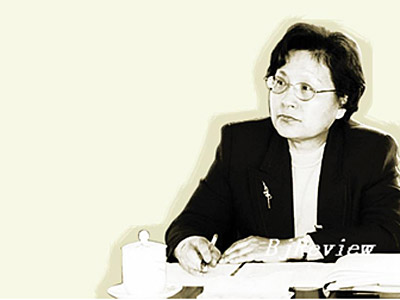
China has recently ramped up its anti-corruption efforts by establishing the National Corruption Prevention Bureau (NCPB). Appointed to lead the bureau, which falls under the Chinese Central Government, is newly appointed Minister of Supervision, 59-year-old Ma Wen, the State Council announced on September 6.
Before she joined the cabinet's lineup this August, Ma had been engaged in internal supervision of the Communist Party of China for almost 20 years. In January 2004, she was elected vice secretary of the Party's Central Commission for Discipline Inspection (CCDI), the top discipline watchdog.
Ma's new agency will center on improving China's anti-corruption mechanisms and devising related regulations, rather than investigating corruption cases. This strategy conforms to a shift in the government's anti-corruption efforts, according to experts. The State Council's announcement, however, was not specific in more detail on how NCPB would operate or how much authority it had to displine corrupt officials.
China's policies to prevent corruption traditionally focused on moral education of government and Party officials, but in recent years a series of rules and regulations were issued to deal with systemic loopholes, covering administrative approvals, financial management, official promotion and the penalty for corrupt officials.
The establishment of NCPB is also a result of the United Nations Convention Against Corruption to be effective in two years. China acceded to the treaty in December 2003, which says in its Article 6, "Each State Party shall, in accordance with the fundamental principles of its legal system, ensure the existence of a body or bodies, as appropriate, that prevent corruption." It is also stipulated that the body or bodies should be granted the necessary independence and provided with the necessary material resources and specialized staff.
According to CCDI, 97,260 officials were disciplined in 2006, more than 80 percent of whom had failed to carry out duties, taken bribes or violated the Party's financial rules.
"We can't count on punishment only. It has a period of effectiveness, but does not get to the root of corruption. We need to enhance the preventive measures."
Yan Qunli, official in charge of anti-corruption publicity and education programs at the Central Commission for Discipline Inspection of the Communist Party of China
"Anti-corruption policies formulated by an independent agency are surely to work better than self-made regulations by individual government departments."
Ren Jianmin, professor at the School of Public Policy and Management of Tsinghua University
"If I could get an address for the Taliban, if I had somewhere to send somebody to and an authority that says publicly they are the Taliban, I would do it."
Afghan President Hamid Karzai, saying at a press conference in Kabul on September 9 that he is prepared to negotiate with the Taliban
"Today we agreed on setting up working groups to prepare for the talks on statehood, nothing more."
Palestinian President Mahmoud Abbas, telling reporters after meeting with Israeli Prime Minister Ehud Olmert in Jerusalem on September 10
"The country does not face an imminent risk of monopoly by foreign companies in any industry."
China Foreign Investment Report 2007 released by the Ministry of Commerce
"You will now see it in action, the bomb that has no match in the world is being tested at a military site."
Alexander Rukshin, Russian Deputy Chief of Staff, speaking to Russia's state ORT First Channel television on September 12, at the testing of the world's most powerful vacuum bomb, which unleashes a destructive shockwave with the power of a nuclear blast
"In the type of ageing society that we foresee, the situation will likely get to the point where there will be little choice but to get some help from them (robots)."
Isao Shimoyama, Dean of the University of Tokyo's Graduate School of Information Science and Technology. Japanese researchers are racing against time to build robots smart enough to serve the needs of the elderly in a country in which 40 percent of the population will be over 65 by 2055 | 